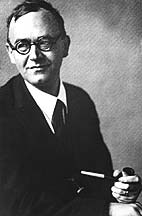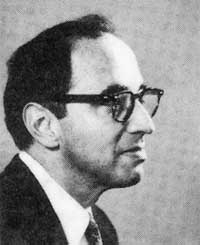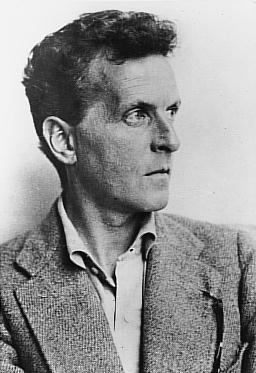Abigail wanted me to make a list of the thinkers I reference in class, and write a few words about each of them and what kinds of questions they are dealing with. This is a start. These are people whose thoughts have influenced my own, with a particular emphasis on things I've read or interacted with recently and therefore might be more likely to reference. I included pictures, because Abigail seems to think that might get me an extra bathroom in my mansion in heaven, and Jesus said to store up treasures in heaven (by which I'm sure he would have included bathrooms had there been indoor plumbing in the first century).
So here it is:
 Karl Barth
Karl Barth
Swiss theologian/really neat guy. When I got my copy of his Church Dogmatics in the mail, a certain classmate of mine responded, "Retire your Bible!" I look forward to reading him after I'm all done with school.
 John Howard Yoder
John Howard Yoder
Awesome facial hair. Mennonite theologian, studied in Switzerland where he had the chance to take a number of classes with Karl Barth. His The Politics of Jesus was widely read and very influential. The cross, not the sword, controls the meaning of history. The relationship between the obedience of God's people and the triumph of God's cause is not one of cause and effect but of cross and resurrection. The church is an alternative polis and engages politically on its own terms. Turn ons: Luke's gospel. Turn offs: Constantinianism.
 James Wm. McClendon, Jr.
James Wm. McClendon, Jr.
Grew up Baptist in Louisiana, went to the University of Texas (my alma mater - Hook 'em Horns!) and Southwest Baptist Theological Seminary in Fort Worth. Was fired from a teaching post at a Southern Baptist seminary in California for sending students to march with Martin Luther King Jr., and he was also fired from a teaching post at a Catholic school in California for being against the Vietnam War. Other than a year as visiting professor of theology at Notre Dame in the 70's (where Yoder, MacIntyre and Hauerwas were all teaching at the time), he pretty much stuck to the West coast. He wrote a non-foundationalist systematic theology from a "baptist" (intentionally small 'b') perspective, by which he intended to include Baptists, Mennonites, Campbellites, Brethren, and many others. His 'baptist vision' is this is that and then is now, by which he means that the church today is the church at the resurrection and the church on the last days. His systematic starts with Ethics (how must the church live to be the church? - Way, Watch-care, Witness), moves on to Doctrine (what must the church teach to be the church? - starts with eschatology, examines the Identity of Jesus Christ and finally the Fellowship of the Holy Spirit), and finishes with Witness (what must the church's stance vis a vis the world be in order to be the church? - theology and culture, theology and philosophy, theology of mission). Wittgenstein, MacIntyre, Yoder, the Radical Reformation.
 Nancey Murphy
Nancey Murphy
Church of the Brethren, Fuller Seminary. Studied Philosophy of Science with Paul Feyerband and Theology with James McClendon. Holism in epistemology. Thinks of theology in terms of Imre Lakatos' concept of scientific research programs. She's a nonreductive physicalist: is there a soul? Sure, but it's embodied. Modern neuroscience, Anglo-American Postmodernism (Wittgenstein, MacIntyre, philosophers of science after Kuhn).
 Stanley Hauerwas
Stanley Hauerwas
Methodist, grew up in Texas as the son of a bricklayer. Studied at Yale, I think before George and Hans were around. Took Old Testament courses from Brevard Childs, who made him think that Ezekiel was Karl Barth. Influenced by many, influencer of many. Time magazine called him "America's Best Theologian", and he thinks that's hilarious: "Best is not a theological category." He doesn't like liberalism. At all. He does like thinking of Methodist identity in terms of being high church Mennonites or free church Catholics. He thinks Christians should tell the truth. Virtue, narrative, church. Yoder, MacIntyre, Wittgenstein. Teaches at Duke.
 George Lindbeck
George Lindbeck
Yale School. Invented the world "postliberal". Cognitive and propositional ways of understanding religion are dumb. And he seems to think experiental and expressivist ways of understanding religions are dumber. Religions are more like cultures or languages. If you proclaim "Jesus is Lord" while striking down the infidel, you're a liar. Kuhn and Wittgenstein. Karl Barth is also a major influence of the Yale School.
 Hans Frei
Hans Frei
Yale School Postliberal. He's bringing narrative back. Narrative got the boot in 18th and 19th century hermeneutics. He seems to want to give historical criticism similar treatment. For a Christian, disbelief in the resurrection is rationally impossible. Karl Barth is a type 4 theologian, and you should be too.
 Richard Hays
Richard Hays
Methodist New Testament scholar, New Perspective on Paul. Subjective genitive, Paul as interpreter of Israel's scriptures. New Testament ethics is about community, cross and new creation. Teaches at Duke.
 Michael J. Gorman
Michael J. Gorman
New Testament, New Perspective on Paul. Studied with Bruce Metzger. Paul is the apostle of the crucified Lord. MJG, Paul and Jesus are all about cruciformity: the way of discipleship is the way of the cross, ethics is about the cross, Jesus is exercising his divinity in the cross - pretty much everything has to do with the cross. And he's right; everything does have to do with the cross. What did you have for lunch? Oh, wow, that really reminds me of the cross! He also apparently has taught adjunct at MHGS, probably before we got Badley.
 Willard Swartley
Willard Swartley
Mennonite New Testament scholar. Narrative and Sabbath. Synoptic Gospels. Peace and peacemaking are major New Testament themes, and are quite a bit bigger (theologically and ethically) than merely "nonviolence".
 Nicholas Lash
Nicholas Lash
British Catholic theologian. Some texts, like Shakespeare's King Lear, are not to be merely read, but instead must be performed. The Bible is such a text, and the church is the group of "performers", most explicitly in the Eucharist but also in her life together. Hope is the Christian alternative to the optimism and despair (both of which claim to know too much about the future) we find in the world.
 Herbert McCabe, OP
Herbert McCabe, OP
Dominican. Thomist. Wittgensteinian Marxist. But God still matters. Wanna understand the Trinity? Be filled with the Holy Spirit and look at the cross.
Most importantly, there's a chance that he may be somehow (very) distantly related to me, through my ancestor John McCabe who fled his homeland during the potato famine as a stowaway on a cattle boat, ending up in South Carolina and (several generations later) giving me reason to call myself "Cabe".
 Alasdair MacIntyre
Alasdair MacIntyre
Scottish Catholic moral philosopher influenced by McCabe. Thomas Aquinas' moral philosophy brought to bear upon the moral discourse of our (post)modern world, which he argues is in grave disorder. Liberal modern individualism is the problem; a community shaped by particular narratives and practices and with a particular account of the virtues, the unity of a human life and the concept of a tradition is the answer. Taught at Notre Dame, where Hauerwas and Yoder and McClendon all found themselves in the late 1970s.
 Terry Eagleton
Terry Eagleton
Influenced by McCabe. Marxism for the (post-)postmodern world (This is not your father's Marxism). Sympathetic to Christianity. Likes to rip on (the new) atheists and the post-structuralists.
 Thomas Kuhn
Thomas Kuhn
Philosopher/Historian of Science. Nancy Murphy describes him as the first to think about science in terms of holism rather than foundationalism. The Structure of Scientific Revoloutions is a widely read and influential text. Scientists assume their paradigm rather than constantly submitting it to scrutiny, and this is a good thing because it allows for normal science to do its proper work. Major changes happen through paradigm shifts or revolutions. Just read the book, it's really interesting.
 Ludwig Wittgenstein
Ludwig Wittgenstein
Philosopher of language and other things. Hung out with the Logical Positivists in Vienna, but they didn't get along too well. Spent much of his career in England with Bertrand Russell. His Tractatus Logico Philosophicus is an exemplary text of modern philosophy. The rest of his work was published posthumously, and could be thought of as being the first philosophy to move beyond modernity. Language games. The foundation is carried by the whole house. Pictures. Lots of other things. McClendon claims he was a Christian, albeit a peculiar one.
That was kind of fun. Did that help? Who have you been influenced by?
 Karl Barth
Karl Barth John Howard Yoder
John Howard Yoder James Wm. McClendon, Jr.
James Wm. McClendon, Jr. Nancey Murphy
Nancey Murphy Stanley Hauerwas
Stanley Hauerwas George Lindbeck
George Lindbeck Hans Frei
Hans Frei Richard Hays
Richard Hays Michael J. Gorman
Michael J. Gorman Willard Swartley
Willard Swartley Nicholas Lash
Nicholas Lash Herbert McCabe, OP
Herbert McCabe, OP Alasdair MacIntyre
Alasdair MacIntyre Terry Eagleton
Terry Eagleton Thomas Kuhn
Thomas Kuhn Ludwig Wittgenstein
Ludwig Wittgenstein